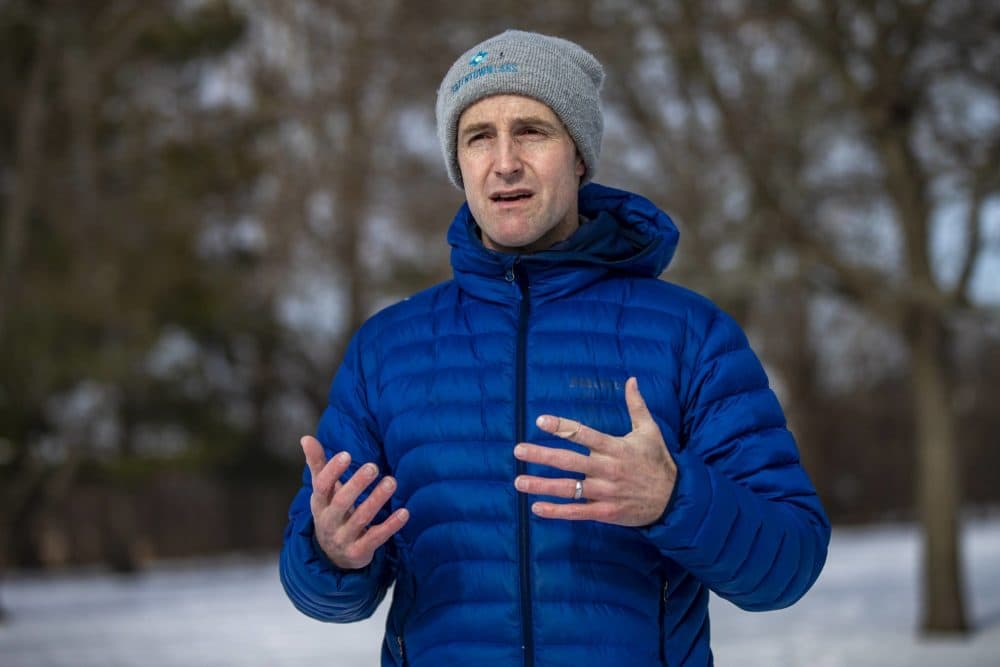Advertisement
Meeting The Gubernatorial Candidates: Ben Downing

All this summer, Radio Boston will invite the major candidates officially running for governor here in Massachusetts to make their case. Former State Senator Ben Downing joined host Tiziana Dearing to tell us why he thinks he should be the commonwealth's next governor.
Earlier this month, we also heard from Republican candidate Geoff Diehl and candidate for the Democratic nomination, State Senator Sonia Chang Diaz.
Interview Highlights
On what he brings to the race:
"I bring a statewide perspective and coalition to the race. I grew up in Pittsfield, represented that community and 51 other communities in western Massachusetts. I know the unique challenges and opportunities that our gateway cities and the rural regions of this state face. But I've also raised a family for the last four years here in East Boston, and know the challenges that this immigrant community deals with every single day around housing, around transportation, and any number of other issues. And I think to be an effective governor, you need to be able to see both those perspectives, bring them together and be able to tap into the potential that exists in all 351 cities and towns in this Massachusetts."
On what sets him apart from other progressive candidates:
"I believe I am a progressive. I have a voting record that is a progressive record from my time in office and have partnered with progressive allies in the State House and outside of the Statehouse to try to bring about the change we need in our communities. And I think the unique aspect that I bring to that is that I have been a climate leader and a climate leader who is focused on equity from day one. I have worked and led on climate issues throughout my entire public career. I'm also a leader who folks can trust. I made a promise that I would term limit myself in my first election in 2006 and kept to that. And when I left, I didn't take some lobbying job. I didn't take some government relations job. I joined a clean energy leader and I said, 'I want to be a part of the transition to a just, a fair, and a sustainable tomorrow for everyone.' So I think I'm uniquely positioned as a progressive in this race to help us make the urgent transition we need to [move] away from fossil fuels to a clean energy economy that benefits everyone."
Advertisement
On campaign strategy and lacking the name recognition of other candidates:
"I think the perspective that I got being away from Beacon Hill, stepping outside of the bubble that too often defines debate at the State House, is a valuable thing. It has allowed me to realize just how small our ambitions are too often at the State House, and the work I did outside of Massachusetts showed me what other states were doing with far less by way of resources. So first, I think I'd bring a unique perspective in that regard.
"Along with that, I'm going to be able to achieve the name recognition we need the only way that you can, the only way that I know how, which is campaigning day and night across the 351 cities and towns of Massachusetts. We've already done 70-plus Democratic town committees and caucuses. We're out there meeting with folks every single day in communities that too often have been an afterthought, too often have been left behind, and I think we have a resilient coalition in western Massachusetts and our gateway cities in and in among climate voters. That's our path to victory both in the primary and the general election, and it's one that I'm excited about."
On creating tax policies to address inequity, like the “millionaire’s tax”:
"I think you need to put everything on the table when it comes to existing economic development incentives, loopholes in our existing structure. You need to be able to look at every single tax in a comprehensive way and say, ‘Who is paying for it, and how do we make sure that we fund the public services that we need?’ For too long in Massachusetts, we’ve fought about this tax hike or that tax cut, and we haven’t had the broader discussion about what are the public goods that we need to fund. And that is how you end up in a broader community here in Massachusetts with massive economic inequality, with regional inequity that leaves behind the communities that I’ve called home in western and central Massachusetts, that leaves behind my neighbors here in East Boston."
This article was originally published on July 27, 2021.
This segment aired on July 27, 2021.

